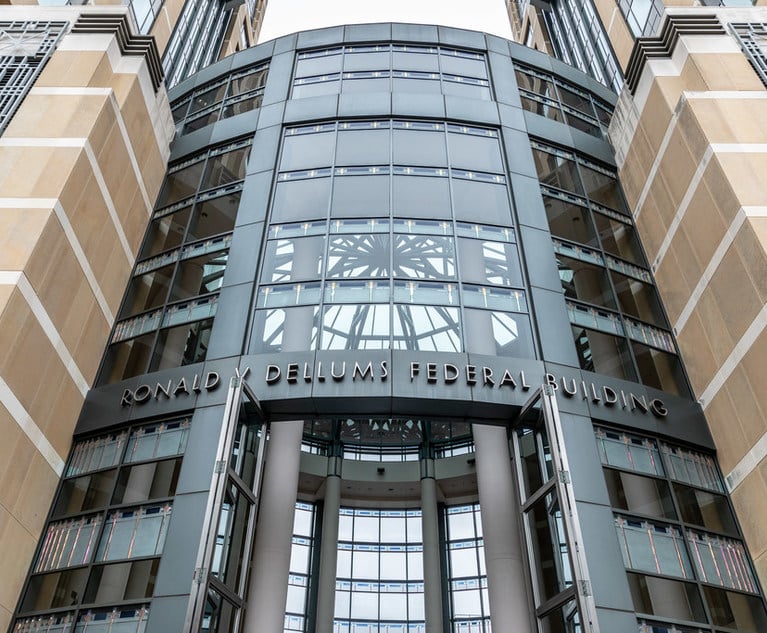Uber Scores an Early (Mostly) Win in Lyft Drivers' Privacy Suit
A federal magistrate judge in San Francisco knocked out state and federal privacy claims based on allegations that Uber used software to pose as Lyft passengers to spy on their rival's drivers. The judge however, allowed a claim brought under California's Unfair Competition Law survive.
April 19, 2018 at 05:18 PM
3 minute read

SAN FRANCISCO — Uber has gotten an early win in a lawsuit brought on behalf of Lyft drivers who claim that Uber violated various federal and California state privacy laws by tracking their driving for the rival ride-hailing platform.
A federal magistrate judge in San Francisco granted Uber's motion to dismiss most of the claims in the lawsuit, finding that the plaintiffs hadn't alleged that Uber had “eavesdropped” on drivers' communications with Lyft or accessed the “content” of those communications.
In Wednesday's decision, U.S. Magistrate Judge Jacqueline Scott Corley of the Northern District of California, who is overseeing the case, noted that the plaintiffs accused Uber of posing as Lyft riders—meaning Uber was accessing information directly from Lyft, rather than its drivers. That Uber software mimicked Lyft riders is “of no moment” for the purposes of the lawsuit, which was brought under federal wiretap law and other statutes, she concluded.
Lawyers at Audet & Partners in San Francisco and Zimmerman Reed in Manhattan Beach, California, sued Uber in April 2017 claiming that the company created spyware to track drivers providing rides on the rival Lyft platform. The lawsuit was filed on behalf of Michael Gonzales, a former Lyft driver, in the wake of a report by The Information that Uber designed software code-named “Hell” to track Lyft drivers' locations using fake Lyft rider accounts.
Mark Burton of Audet & Partners didn't respond to messages Thursday.
On motion to dismiss, Uber's lawyers at Shook, Hardy & Bacon—Patrick Oot Jr. in Washington, D.C., and M. Kevin Underhill and Annie Chuang in San Francisco—argued that the plaintiffs couldn't show just what Lyft driver communications Uber had intercepted or how it had done it.
“The communications occurred directly between Lyft and Uber posing as Lyft riders; there was no contemporaneous transmission between plaintiff and Lyft that was stopped or interrupted by Uber,” Corley wrote.
Corley also found that the Lyft driver Gonzales had no grounds to bring an invasion of privacy claim under California's Constitution due to the fact that he was already broadcasting his location via the ride-hailing app.
“Plaintiff consented to the sharing of his geolocation data with perfect strangers (Lyft riders); thus, under the circumstances he did not have a reasonable expectation of privacy in such information,” Corley wrote.
Corely did, however, wave through Gonzales' claim under California's Unfair Competition Law alleging that he lost revenue since Uber's efforts—aimed at getting drivers to offer rides only on its platform—caused greater wait times for Lyft riders and drove users to the more heavily populated Uber platform.
“Whether plaintiff will be able to prove that allegation is a question for another day,” she wrote.
An Uber spokesman on Thursday declined to comment on the decision.
This content has been archived. It is available through our partners, LexisNexis® and Bloomberg Law.
To view this content, please continue to their sites.
Not a Lexis Subscriber?
Subscribe Now
Not a Bloomberg Law Subscriber?
Subscribe Now
NOT FOR REPRINT
© 2025 ALM Global, LLC, All Rights Reserved. Request academic re-use from www.copyright.com. All other uses, submit a request to [email protected]. For more information visit Asset & Logo Licensing.
You Might Like
View All
Farella Elevates First Female Firmwide Managing Partners

'Nerve-Wracking': Fires Disrupting but Not Halting Work of Distributed Firms' LA Lawyers
3 minute read
Miami Judge Approves Shaq's $11 Million Settlement to Resolve Astrals Investor Claims
3 minute read
Crypto Exchange’s ‘Meteoric Rise’ Leads to Nationwide Class Action Trend
4 minute readTrending Stories
- 1Sonos' Legal Chief Sees Pay More Than Quadruple Amid Executive Upheaval
- 2Shareholder Democracy? The Chatter Musk’s Tesla Pay Case Is Spurring Between Lawyers and Clients
- 3Can a Law Firm Institutionalize Its Culture? Boies Schiller’s New Chairman Will Try
- 4Full 8th Circuit Hears First Amendment Challenge to School District’s ‘Equity Training’
- 5Exploring Generative AI’s Impact on Intellectual Property
Who Got The Work
J. Brugh Lower of Gibbons has entered an appearance for industrial equipment supplier Devco Corporation in a pending trademark infringement lawsuit. The suit, accusing the defendant of selling knock-off Graco products, was filed Dec. 18 in New Jersey District Court by Rivkin Radler on behalf of Graco Inc. and Graco Minnesota. The case, assigned to U.S. District Judge Zahid N. Quraishi, is 3:24-cv-11294, Graco Inc. et al v. Devco Corporation.
Who Got The Work
Rebecca Maller-Stein and Kent A. Yalowitz of Arnold & Porter Kaye Scholer have entered their appearances for Hanaco Venture Capital and its executives, Lior Prosor and David Frankel, in a pending securities lawsuit. The action, filed on Dec. 24 in New York Southern District Court by Zell, Aron & Co. on behalf of Goldeneye Advisors, accuses the defendants of negligently and fraudulently managing the plaintiff's $1 million investment. The case, assigned to U.S. District Judge Vernon S. Broderick, is 1:24-cv-09918, Goldeneye Advisors, LLC v. Hanaco Venture Capital, Ltd. et al.
Who Got The Work
Attorneys from A&O Shearman has stepped in as defense counsel for Toronto-Dominion Bank and other defendants in a pending securities class action. The suit, filed Dec. 11 in New York Southern District Court by Bleichmar Fonti & Auld, accuses the defendants of concealing the bank's 'pervasive' deficiencies in regards to its compliance with the Bank Secrecy Act and the quality of its anti-money laundering controls. The case, assigned to U.S. District Judge Arun Subramanian, is 1:24-cv-09445, Gonzalez v. The Toronto-Dominion Bank et al.
Who Got The Work
Crown Castle International, a Pennsylvania company providing shared communications infrastructure, has turned to Luke D. Wolf of Gordon Rees Scully Mansukhani to fend off a pending breach-of-contract lawsuit. The court action, filed Nov. 25 in Michigan Eastern District Court by Hooper Hathaway PC on behalf of The Town Residences LLC, accuses Crown Castle of failing to transfer approximately $30,000 in utility payments from T-Mobile in breach of a roof-top lease and assignment agreement. The case, assigned to U.S. District Judge Susan K. Declercq, is 2:24-cv-13131, The Town Residences LLC v. T-Mobile US, Inc. et al.
Who Got The Work
Wilfred P. Coronato and Daniel M. Schwartz of McCarter & English have stepped in as defense counsel to Electrolux Home Products Inc. in a pending product liability lawsuit. The court action, filed Nov. 26 in New York Eastern District Court by Poulos Lopiccolo PC and Nagel Rice LLP on behalf of David Stern, alleges that the defendant's refrigerators’ drawers and shelving repeatedly break and fall apart within months after purchase. The case, assigned to U.S. District Judge Joan M. Azrack, is 2:24-cv-08204, Stern v. Electrolux Home Products, Inc.
Featured Firms
Law Offices of Gary Martin Hays & Associates, P.C.
(470) 294-1674
Law Offices of Mark E. Salomone
(857) 444-6468
Smith & Hassler
(713) 739-1250






